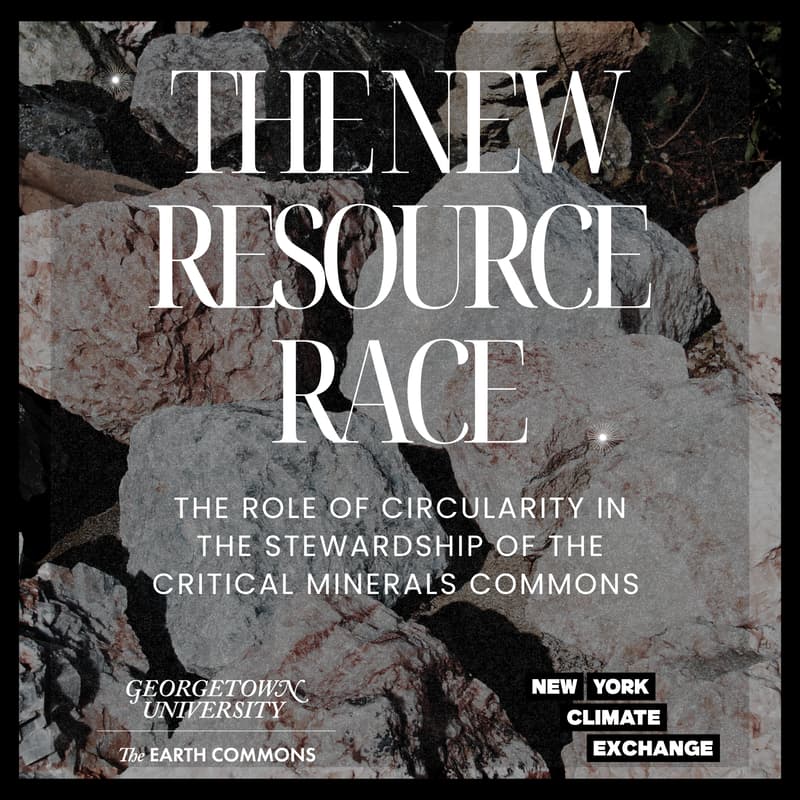

The New Resource Race: The Role of Circularity in the Stewardship of the Critical Minerals Commons
Join The New York Climate Exchange (The Exchange) and The Earth Commons, Georgetown's Institute for Environment & Sustainability for a panel discussion featuring leaders in policy, research, engineering, and deployment on how circular policy and technology interplay in the stewardship of the critical mineral commons.
This panel will address the current state of the domestic and global critical minerals supply chain and their role in the semiconductor, defense, electric vehicle, and renewable energy economies. The event will conclude with the expert panel offering their perspectives on how policymakers, private companies, and finance professionals can steward the critical minerals commons while supporting the economic growth of the core energy and technology industries and navigating the shifting incentives and regulatory landscape.
========================================
Agenda (notional)
1:00 pm Check-in and networking
1:30 pm Opening remarks
1:40 pm Panel Introductions
1:50 pm Moderated Q&A and Panel Discussion
2:20 pm Georgetown Student Q&A
2:30 pm Full Audience Q&A
2:50 pm Final Announcements and Closing Remarks
3:00 pm Networking Time
======================================
Background:
The demand for critical minerals has surged, driven by their use in semiconductors and lithium-ion batteries. The use of batteries alone has grown by 33% annually over the past 30 years, with the global EV stock skyrocketing from 100,000 vehicles in 2013 to over 40 million in 2023. Many of the rare earth materials in batteries, including nickel, lithium, cobalt, and manganese, are mined and processed under situations of environmental degradation and human rights abuses in politically unstable regions.
A circular economy for critical minerals would mitigate many of these challenges. Secondary uses of battery cells would extend the life and utility of existing assets, reducing demand for virgin batteries and raw materials, as well as strain on their supply chains. Expanded recycling, meanwhile, would create business opportunities putting raw materials back into the supply chain, reducing the need to extract new critical minerals.
========================================
Background
The New York Climate Exchange has launched Project Closed Circuit, an initiative that addresses the surging demand for batteries by creating a replicable framework for local circular economy creation through key partnerships with city governments, entrepreneurs and innovators, and researchers within our network. Currently, the necessary infrastructure, policies, and scaled technologies for a resource-efficient, local circular economy for batteries are lacking globally. To address this gap, The Exchange will cultivate and scale circularity solutions by uniting our coalition for cross-geographic, multi-disciplinary, holistic research, policy, and innovation collaborations.
About the Earth Commons Institute
Georgetown’s Earth Commons Institute is a hub for environmental and sustainability innovation, research and education to accelerate action on the most pressing issues of our earth. Assembling a team of interdisciplinary experts, researchers, leaders and students, the Earth Commons is transforming the university into a living laboratory to develop scalable solutions for a greener, more sustainable world.
About the New York Climate Exchange
Founded on the belief that collaboration works, The New York Climate Exchange is more than an academic institution; it's a dynamic think-tank and do-tank working at the intersection of climate policy, finance, science, and technology to advance climate solutions locally and globally. The Exchange unites top-tier universities, corporations, and community organizations via an engagement model that posits that better outcomes result from bringing different perspectives to the table.
By registering for this event, you agree to share your registration information with the organizers of DC Climate Week.